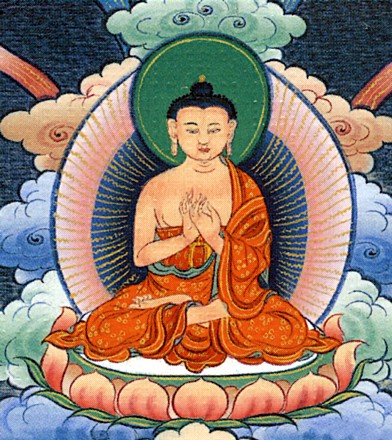Dzogchen Tantras: Difference between revisions
Jump to navigation
Jump to search
No edit summary |
|||
| Line 9: | Line 9: | ||
==Further Reading== | ==Further Reading== | ||
*[[Khenpo Ngawang Palzang]], 'The Dzogchen Scriptures' in ''Quintessential Dzogchen'', edited by Erik Pema Kunsang and Marcia Binder Schmidt, Rangjung Yeshe Publications, 2006 | *[[Khenpo Ngawang Palzang]], 'The Dzogchen Scriptures' in ''Quintessential Dzogchen'', edited by Erik Pema Kunsang and Marcia Binder Schmidt, Rangjung Yeshe Publications, 2006 | ||
*[[Tsele Natsok Rangdrol]], ''Mirror of Mindfulness: The Cycle of the Four Bardos'', translated by [[Erik Pema Kunsang]] (Boston & Shaftesbury: Shambhala, 1989), Appendix 'The Dzogchen Tantras' (summary of the teachings of [[Vimalamitra]], [[Longchenpa]] and [[Khenpo Ngakchung]] as recorded in the [[Nyingtik Yabshyi]] and its related commentaries.). | |||
==Internal Links== | ==Internal Links== | ||
Revision as of 15:31, 31 August 2010

The Dzogchen Tantras (Wyl. rdzogs pa chen po'i rgyud sde) were compiled by the first human Dzogchen master Garab Dorje.
Number
According to the writings of Longchenpa, the phrase “six million, four hundred thousand tantras” is actually meant to be taken as 6,400,000 stanzas. As for the number of tantras, there are said to be 22,000, corresponding to the number of subtle channels in the vajra body. Because of the way in which the subtle body is formed, there is a correspondence between the number of channels and the number of tantras. Other commentators have said that there are 6,400,000 stanzas in Mengak dé alone; and another 6,400,000 in Sem dé; and when it comes to Long dé, some say there are six million, while some say five million.[1]
Notes
- ↑ Nyoshul Khen Rinpoche, private interview.
Further Reading
- Khenpo Ngawang Palzang, 'The Dzogchen Scriptures' in Quintessential Dzogchen, edited by Erik Pema Kunsang and Marcia Binder Schmidt, Rangjung Yeshe Publications, 2006
- Tsele Natsok Rangdrol, Mirror of Mindfulness: The Cycle of the Four Bardos, translated by Erik Pema Kunsang (Boston & Shaftesbury: Shambhala, 1989), Appendix 'The Dzogchen Tantras' (summary of the teachings of Vimalamitra, Longchenpa and Khenpo Ngakchung as recorded in the Nyingtik Yabshyi and its related commentaries.).